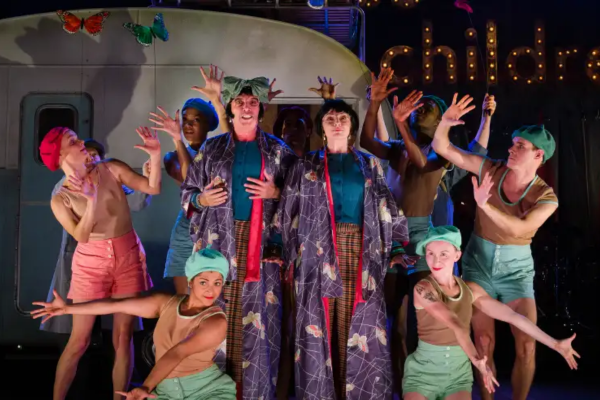16 July 2024
Emma Rice on Putting the 'Play' back into Theatre Making
Emma Rice
British theatre director, writer, and actor.
Emma Rice is amongst the UK's best known, and most loved, theatre makers. In the course of her celebrated career, she has been an actor, choreographer, writer, director, and from 2016-18, Artistic Director of Shakespeare's Globe. In 2018, she established her own company, Wise Children.
In an exciting new partnership, Wise Children and Digital Theatre+ have collaborated to bring films of Emma's work together with a set of detailed digital resources for teachers and students.
In this article, Emma talks about the secret behind her extraordinary body of work...
"I am often asked how I make my work, and it's a difficult question to answer. Each piece feels different to me, and requires a different way of working.
There is one thing that is consistent across all my shows, and in all my rehearsal rooms, though, and that is a sense of playfulness.
Play
Play! What a brilliant word. We are all born playful, but all too often it is knocked out of us from the moment we are born - especially if we are girls. We are rewarded for being good, for being polite, for being truthful, quiet, and kind, and for not causing trouble.
Don't misunderstand me, I respect a lot of these things - I certainly wish for more kindness in all areas of life - but isn't it interesting how diminishing these 'nice' words sound when you put them together?
To access a genuine state of play takes commitment and hard work. It takes self-knowledge, vulnerability, and bravery. I was in my mind-20s before I learnt how to play and, although I found it challenging at first, I was lucky enough to learn from the masters - Kneehigh Theatre Company.
They took the then-serious, intense, rulebook-bound Emma, and taught me to misbehave, to be in the moment, to have a twinkle in my eye and to enjoy a little bit of misrule amongst the serious business of making theatre.
So, how do we do this? How can we embed the value of play in our lives, when the world sometimes seems so uncertain, so precarious and frightening? First, we need to talk about what's in the way.
There are many enemies of 'play', but the biggest one is fear.
Fear
I hate fear. I am filled with it, but if I had one wish, I would use it to eradicate this useless and debilitating emotion from the home, the classroom, and the rehearsal room. And so, while I am anything but superhuman, I have come up with techniques to minimise fear in the making of theatre:
Recognise that everyone is frightened
We are all managing our fears, all of the time. Mostly, our fears are pretty simply. Am I good enough? Am I liked? Do I fit in? Will I be found out? Will I succeed?
In rehearsals, I ask my actors to get up and reveal themselves in all sorts of ways. I ask them to sing, dance, explore and improvise, to access - and show - their emotions.
And then (as if this is not enough!), I ask them to stand in front of strangers, and see if they like what they have done. They get reviewed and noted in the press, in the bar, and on their phones. Can you think of an environment less conducive to play? No!
Allow our fears to unite, rather than divide
Theatre is a hotbed for fear, self-doubt, and defensiveness - and none of this helps us to make meaningful and inventive work. I try to tackle these fears even before rehearsals begin.
I make a conscious decision from the moment I cast an actor, that their success or failure is entirely down to me.
I try not to judge them ever again - I see it as my job to bring out the best in them. Once in the room, everyone is equal: stage managers, producers, and light designers have the same value as an actor, and everyone joins in.
Who are Wise Children? Explore Emma Rice's Theatre Company | © Wise Children
Games
We always start the day with a game. We play ball - I love a ball game because, again, it pushes the group focus outwards, not the individual focus inwards.
The ball becomes the metaphor for the piece and the company. We all have to work together to keep it up, or over, or in... whatever that day's game might be.
Playing in this literal sense gets all our emotions out and done with. We get frustrated and try to negotiate, we laugh, fight, and celebrate. There will be competitive, sporty types who want to win, and timid ones who want the torture to end as soon as possible. The group will soon iron these dynamics out - a good game is a great leveller.
As the leader in the room, I am careful to keep the mood light and the bar low - I am no Andy Murray (and I wear my sporting inadequacies with pride). I reward good team work, and tease those who play too aggressively.
I remind the company that this is theatre, and that the goal is an open one.
Once we are full of oxygen and working as one, that's when we warm-up.
Warm-Ups
In warm-ups, I use lots of yoga techniques to cool the mind as we warm the muscles. We find our silence, we find our breath, and we take a moment to turn down the noise of the world.
We are creating a new, temporary and clean environment for our day's work.
And then, we sing.
Song
Some people can sing well, and some can't - but again, we all join in. Every day.
Singing creates an almost primal sense of community. It reminds us of church and family, of Christmas and any other inherited traditions - but this singing is not imposed. This is chosen.
We are making our own church, our own rituals, and our own community - complete with its own moral compass and core values.
And then, we are ready to work.

Ready to work? Book your Digital Theatre+ demo today!
The Collective Imagination
In my early years as an actor, I remember wishing that someone would notice me, see what I was capable of, and help me to release it. Whilst my actors are a hundred times more talented than I ever was, they still need and look for my guidance and approval. as a director, it is my job to notice them, to see them and I hope, to release them.
I use all sorts of things to take away their fear and allow them to play freely. I dim the lights, I play music to take away the need to speak, I improvise with them, suggesting what they might do next or encouraging them to go further with their 'offers'. I encourage them to dress up in silly costumes, and I set them tasks to work on that they can come back and share with the group.
And most importantly, I show my delight in them and what they are doing.
Actors need to feel my connection to them and their work in order to learn more about the world we are creating. For this reason, I am always generous in my response. I laugh like a drain and cry like a baby. And I try to never criticise - we are all very good at criticising ourselves, so there is no need for anyone else to pile in!
I reward great ideas, and I trust that the ideas that aren't working as well will fade away naturally. Bad ideas don't need my attention.
By removing criticism from the room, I am actively removing fear and encouraging play. My actors start to push at the boundaries, and this is when the magic happens. This is when innovation happens. I want to be surprised, and I don't need to be the loudest voice in the room.
I not only believe, I know that the shared imagination is far greater than my own. So I nurture it, respect it, and take care of it. This precious and exhilarating prize, the 'collective imagination', is fed by play, enabled by play, and kept alive by play.
The Cast of Wise Children | Wise Children Key Scene | © Wise Children
How to Encourage 'Play' with your Students
So! Here are some provocations for you:
- Devote regular time for fun: Have a Friday afternoon tea, play a game outside, or even start a choir - I bet someone in your class is musical (or that you can find a local musician to help!).
- Let your students take responsibility: Turn your traditional structure upside down, and make the decision that your students are in charge for once.
- Create a fearless culture: Failure is essential if you want success. Yes, if something goes wrong, question it - and find ways to prevent it. But then, laugh about it!
Teams will work harder and longer, and will enjoy their work more and more. They will look for ways to surprise and delight you, and to be imaginative in their responses to even the simplest or most mundane of tasks.
In this new environment, this new culture, new ideas will spring. Instead of following the rules, you will start making your own.
Remember: you know your students better than anyone else, so have a think about what activities might suit them, and give them a try.
What's the worst that could happen?
Thank you to Emma Rice for her contributions to the Digital Theatre+ Blog. If you'd like to explore Emma's work and are not yet a customer of Digital Theatre+, please get in touch with a member of our team today. If you already have a subscription, click here.
Related blogs
Interactive playtexts make ‘page to stage’ a reality
Educators have long written about the journey from ‘page to stage’. This usually refers to the...
Read moreFor Flute Theatre, Shakespeare Shows How Love Conquers Fear
Kelly Hunter MBE is the Artistic Director of Flute Theatre, and the author of Shakespeare's...
Read more3 Ways to Unlock Characterization in Julius Caesar [Free PDF]
First performed in 1599, Julius Caesar is often dubbed Shakespeare's most rhetorical play, making...
Read moreGet the latest teaching tips straight to your inbox
Explore free lesson ideas and inspiration, education news, teaching trends and much more by signing up to regular blog updates!







